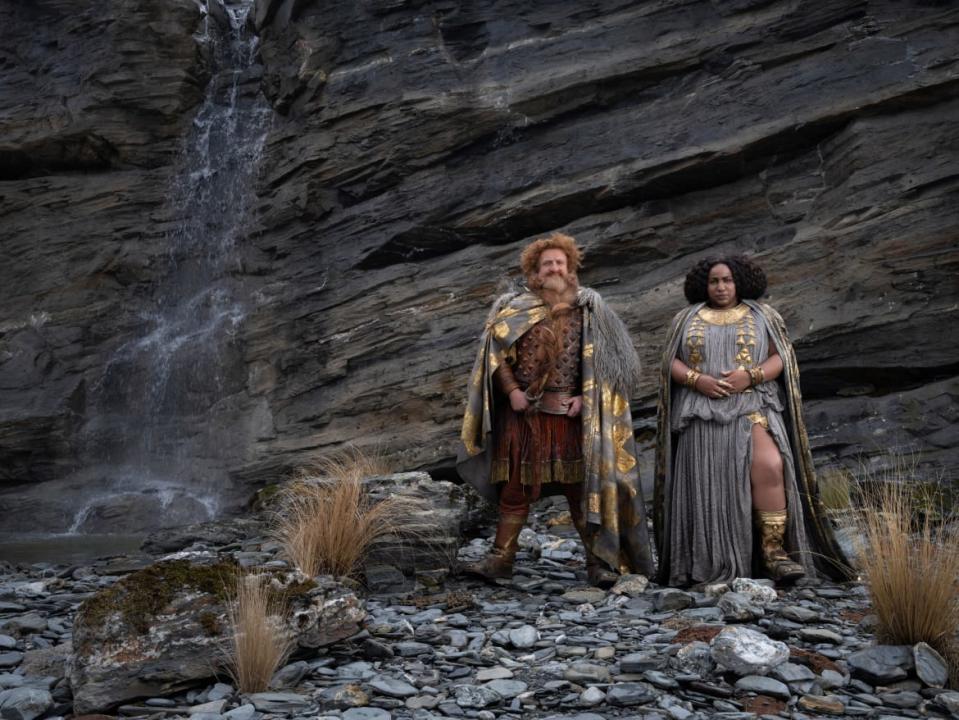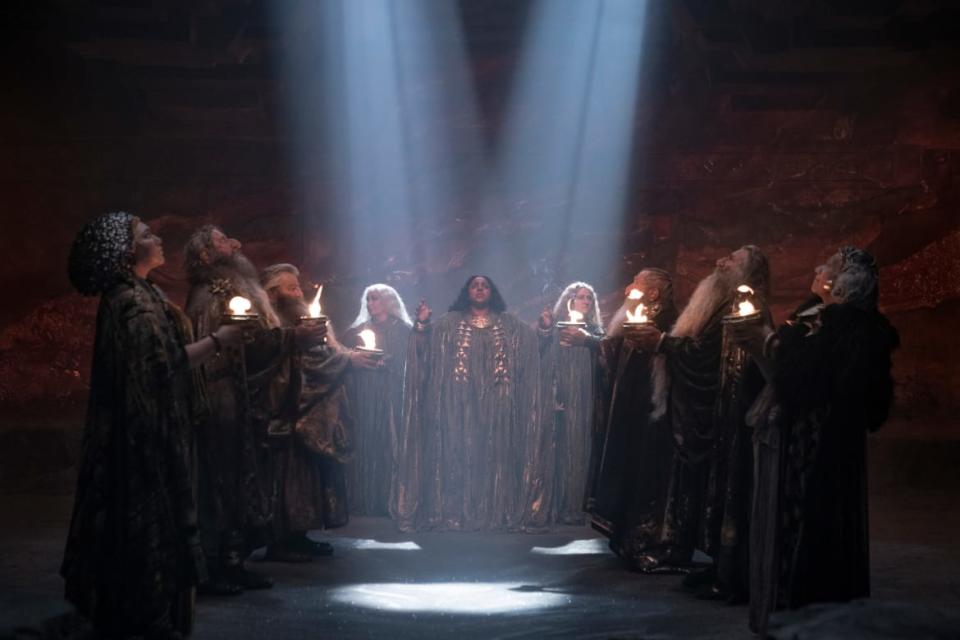Lord of the Rings’ First Female Dwarf Does, in Fact, Have a Beard

Rest easy, Lord of the Rings fans, because our long, hair-raising nightmare is over: After months of uncertainty, everyone can now watch Amazon Prime’s Rings of Power and confirm that the first female dwarf ever seen on screen does, in fact, have a beard.
Ahead of the premiere, The Daily Beast spoke with actress Sophia Nomvete, who plays Princess Disa—the first dwarven woman ever depicted on screen in a Tolkein adaptation. Although the career-changing role presented many opportunities, Nomvete’s enthusiasm burst to the surface when I asked about the beard. “I was so excited,” the actress said, with undeniable verve. “I knew that I wanted it. Everyone knew that we wanted it.”
Much like everything else about Amazon’s meticulously produced, obscenely expensive new TV series, Nomvete says a great deal of care went into selecting Disa’s facial hairstyle—applied “hair by hair.”
We first meet Disa when young Elrond—played in the series by Robert Aramayo, and by Hugo Weaving in Peter Jackson’s films—shows up at the dwarves’ secret kingdom to ask his old friend, her husband Durin, for a favor. (It doesn’t go well in the beginning.) In her character breakdown, Nomvete recalls Disa was described as very maternal and warm, but with a fierce warrior side to her. How appropriate, then, that she makes her first appearance while chasing her children around in circles.
Amazon’s ‘Lord of the Rings’ Series Is Absolutely Stunning—and Puts ‘House of the Dragon’ to Shame
When asked how she would describe her character, Nomvete answered with a Tolkein-esque metaphor: “She has a real water about her, kind of a watery temperament. But water can crush and wither a mountain.”
Disa “has this unapologetic beauty. Warmth. Calmness. Joy. But she’s kind of a badass as well,” Nomvete noted, adding that she can break apart rocks by modulating her pitch as she sings. “She draws her power from her voice in order to literally move mountains.”

Nomvete still remembers that, when she first met her on-screen husband, Owain Arthur, they were staying in the same hotel—as he rode down in an elevator, she recalled with humorous affection, “I could literally hear him in the hallway, he’s so bloody loud.”
It didn’t take much for the actors to develop their chemistry. Apparently, it was all in that first meeting.
“We just locked eyes, both did this huge cheesy group and just said, ‘We’re gonna be alright,’” Nomvete recalled with a laugh. “And then we just went and had a cup of tea, and we laughed, and we had great potty humor. There was a gregariousness and a safety around us, right from the word go.”
In describing what it’s like to play a marriage like this—one that’s loving and respectful and united—Nomvete borrowed a widely memed phrase from Sean Bean’s Boromir: “It is a gift.”
The show’s production was actually a blessed period for Nomvete in a number of ways. Five days before she learned she’d won the role, she’d given birth to a baby girl. Even during that first call, Nomvete said, the production established that they were willing to support her as she juggled early parenthood, even asking what provisions she might need in order to breastfeed during the long production days. That support continued into Nomvete’s first meeting with costume designer Kate Hawley, who made sure her costume came apart at the shoulders to facilitate breastfeeding.
“We are in a position, apparently, where you can land the most life-changing gig of your entire career whilst the baby’s very much engaged and the midwife’s on speed dial,” Nomvete said. “It was a crazy, amazing time, and hugely empowering actually… I knew that this is the way that I wanted it to go. I knew I wanted to feed her this way and I knew I never, ever wanted it to stop, regardless of what was going on around me. ”

“I hope that I'm one of many brilliant examples of how the film industry can just open their minds and open their hearts so that we can do what we need to do to get through, regardless of the scale or the magnitude of our work,” Nomvete said.
In this case, the scale is enormous—as in, Rings of Power’s first season reportedly cost Amazon $715 million. One destination for that money—apart from fake beards applied one hair at a time—was the show’s sets, built out wherever possible to give the actors real-world inspiration. As Nomvete described the experience of planting her dwarven boots on “real rocks from the grounds of New Zealand,” my mind flashed, momentarily, to Nathan Fielder in The Rehearsal. The results, however, are undeniable: Rings of Power is a memorably gorgeous series, down to the last pebble.
The ‘Lord of the Rings: The Rings of Power’ Team Already Fears Racist Backlash Against Cast
“We were lit by fire—when we were on set, we didn’t see the light of day until we came out,” Nomvete said. “Walking onto the set, you literally felt like you were in the middle of a mountain.”
Tolkein’s literary universe is replete with backstory on the dwarves, Nomvete notes, but information on female dwarves, specifically, remains a bit more slight. More unprecedented than seeing a female dwarf on screen for the first time, however, is how Rings of Power works to reverse a more pernicious aspect of Lord of the Rings and its previous adaptations, which tended to equate dark skin with evil. (Remember when The Hobbit canned its casting director in 2010 for deciding that a woman of Pakistani descent was too dark-skinned to play a halfling?)
Rings of Power takes a different approach. Alongside Nomvete playing a dwarf, Ismael Cruz Córdova—who is Afro-Latino—plays an elven warrior. The Harfoots, a nomadic tribe of hobbits, are diverse as well. As one might expect, a loud, toxic corner of the Lord of the Rings fandom has complained that such depictions are “inauthentic” to Tolkein’s fictional universe. But as Nomvete put it, “People of color exist in the world. And so I find it utter madness that we don't or couldn't exist within the world of fantasy, of all places.”
“Now, generations will have what I didn't have, which is to be able to enjoy [the story], NS also see themselves staring back at them. And they will be able to exist not just in our world, but in the world of fantasy.”
Get the Daily Beast's biggest scoops and scandals delivered right to your inbox. Sign up now.
Stay informed and gain unlimited access to the Daily Beast's unmatched reporting. Subscribe now.


